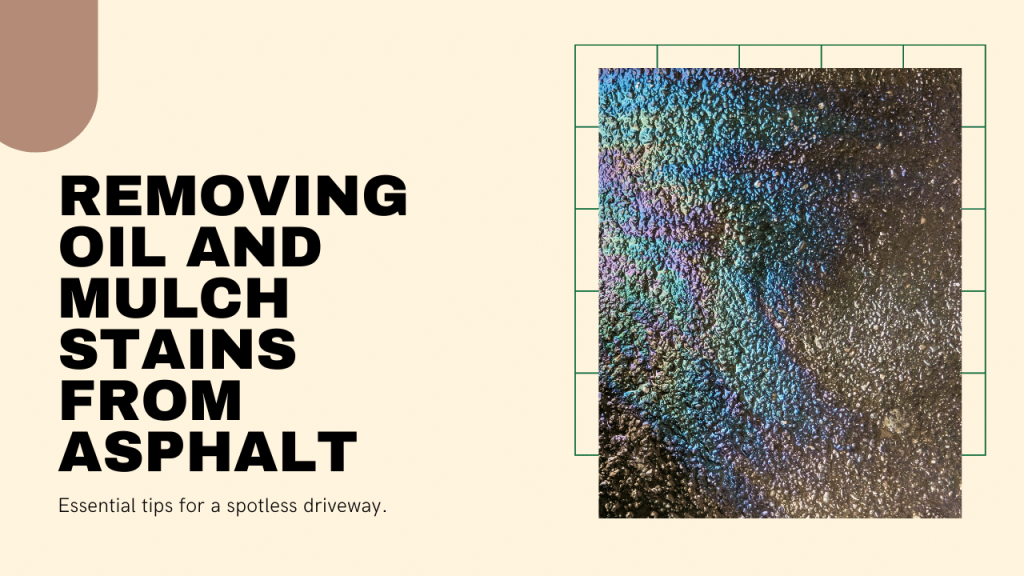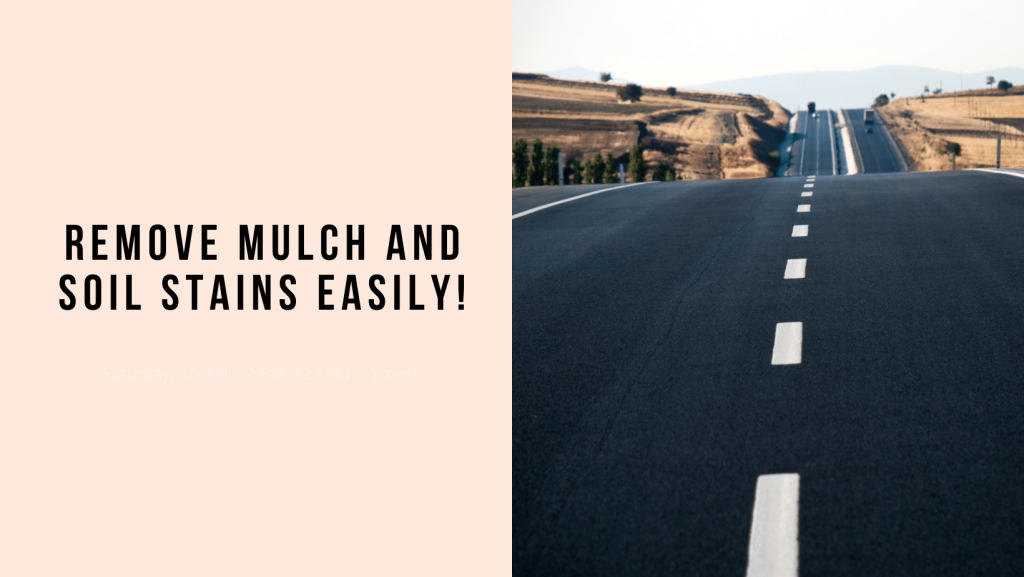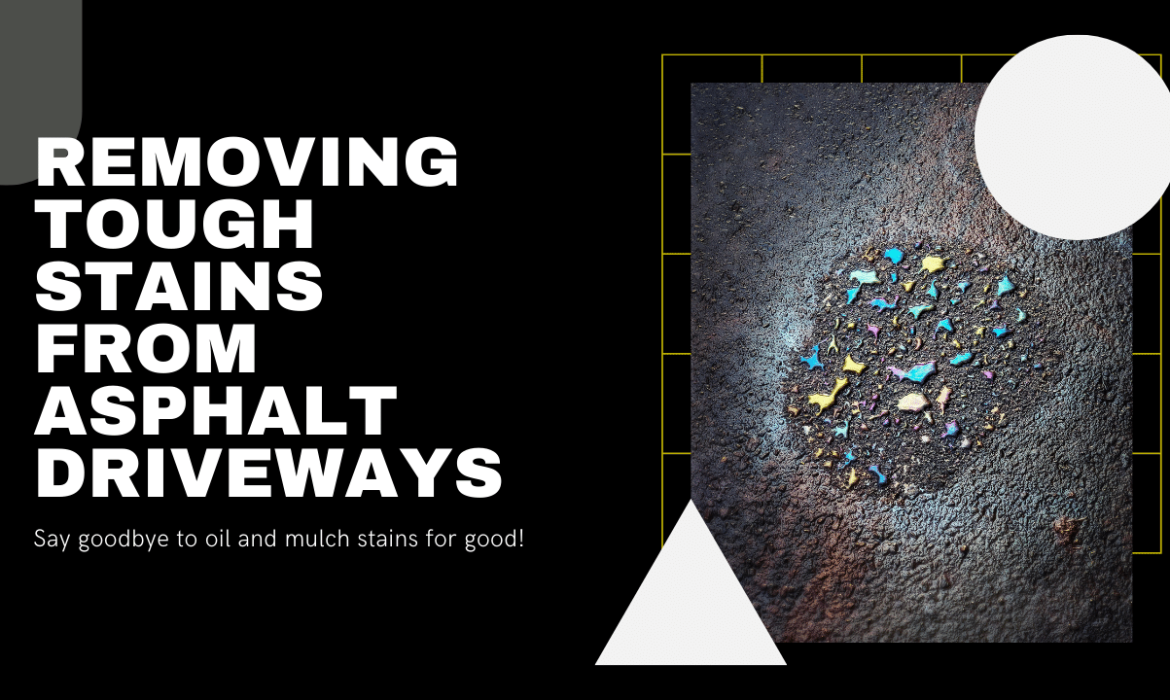Asphalt driveways and parking lots can get covered by oil that drips from cars or mulch of soil and landscaping. Such blemishes can enormously lower the attractiveness of the asphalted surfaces and are, then, typically not aesthetic to look at. Most of the cleaning solutions and techniques used in cleaning asphalt surfaces can be used to remove oil and mulch stains. Here’s a step-by-step guide.
Assessing the Stains
The first step in the stain removal process is to evaluate the area to decide on the nature and scale of the stains. Tiny oil drops or thinly applied layers like mulch can be removed without effort. Trapped in spaces where oil has seeped into the tiny cracks of the asphalt or where oil collects in vast mounds of tightly packed mulch will require significantly more effort to disengage entirely.

Safety Precautions
Make sure to take safety precautions when using chemical cleaning solutions:
– Work in a well-ventilated area and use protective clothing when handling chemicals
– Always ensure you have on gloves and eye protection
– Do not apply the solutions in areas where plants, lawns, pets, or children are present
Removing Oil Stains
Oil is known to penetrate the pores of the asphalt and, therefore, leaves behind a tough stain. This is where solvents come in handy because, with the right ones, the oil can be extracted out. Here are a few options:
Kitty Litter or Cornmeal
For small oil drips or some type of surface stains, pour kitty litter or cornmeal over the stains. Leave it to stand for about a day so that the absorbent material can adequately soak up the oil, then sweep it away. This may have to be done several times to ensure thorough oil evacuation.
A mixture of dish soap and hot water is probably the most essential cleaning tool in nearly every household.
For oil stains, it is recommended to use a degreasing dish soap and warm water. Some practical advice includes scrubbing the solution into the stain with a stiff brush. Repeat this step until the area is clean, and then rinse well.
Cleaner Degreasers
Specific target cleaning materials such as Simple Green are effective in removing oil stains from asphalt. Apply the degreaser either by spraying it or by scrubbing it gently over the affected area. Allow this to stand for 10-15 minutes, then wash well with water from a hose. To prevent skin contact with these products, make sure that you wear gloves when handling them.
Cleaning Stains from Mulch and Soil
Mulch, soil, and clay can go deep into asphalt driveways and leave marks that can be unsightly. Use these methods to remove the stains:

Household Cleaners
One method is to spray the stains with detergent, ammonia, or bleach, commonly used in a household. Ensure that you sweep first with a push broom and then scrub the area with a mop. In order to wash the organic material away, water should be used to rinse, preferably with a hose. As a necessary precaution when handling these chemicals, wear protective clothing.
Pressure Washer
If you have a lot of mulch or dirt on your deck, rent a heavy-duty pressure washer. Use low pressure and keep the nozzle at least one and a half meters from the surface to prevent damage to the existing asphalt. The pressure applied from pressure sprayers can quickly force the stained material to rise from the surface of the asphalt.
DIY Asphalt Cleaner
Proper recipes for lightly soiled areas include 1 quart of liquid detergent, 2 quarts of automatic transmission fluid, and 5 gallons of hot water. Apply this solution to the stains, scrub, and then rinse with a hose. Wear gloves to avoid the danger of chemical burns.
Preventing Stains
To help prevent future staining:
– Sweep and clean debris on the asphalt to ensure a clean surface
– Address oil leakage that emanates from vehicles
– Keep landscaping mulch and soil in containers or contained areas
– Spray a coat of concrete sealer to give asphalt a protective barrier
Removing Stubborn Stains
For stubborn oil and mulch stains that resist standard cleaning methods:
Rent an Ergonomic Rotary Surface Cleaner
This pressure-washing attachment cleans the asphalt by applying pressure on the ground and washing it with water simultaneously. It will assist in eradicating deeply settled discolorations and, simultaneously, cannot harm the asphalt.
Hire a Professional Service
If the stains are still proving very hard to remove, consider calling a company specializing in cleaning asphalt to see if they can offer a solution. They have access to some of the harshest cleaning chemicals and machinery for removing stubborn stains.
Replacing the Asphalt
In cases where attempts to clean stained surfaces are ineffective, the affected portion of asphalt may require replacement. This includes cutting part of the stained asphalt and laying a new hot mix to reconstruct that area. It is recommended that replacements be done by professional asphalt contractors. You may want to seal the brand-new surface of the asphalt to avoid any stains in the future.
Sealing can make the surface of the asphalt look cleaner and even more attractive. By using the right solutions, most of the asphalt stains can be removed with hard work, but a complete replacement will not be necessary. When using chemical cleaners, be sure to use the proper protective measures. Thus, stained asphalt is likely to be able to be cleaned and returned to a new look.

